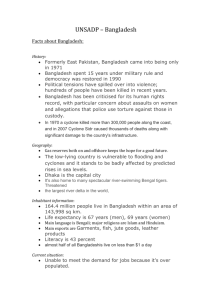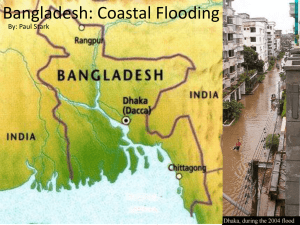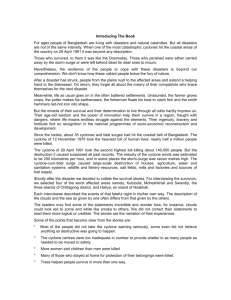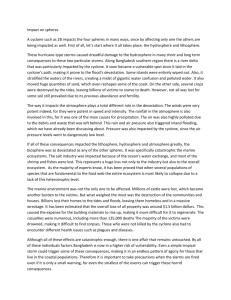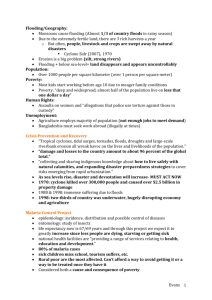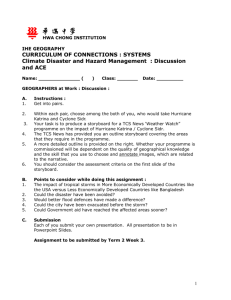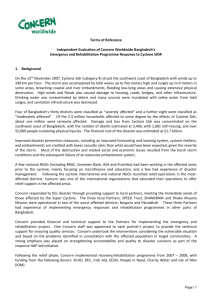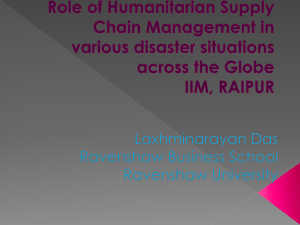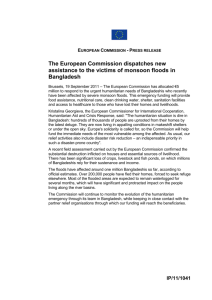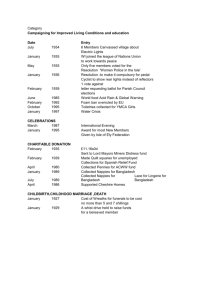Humanitarian Assistance - Permanent Missions to the United
advertisement
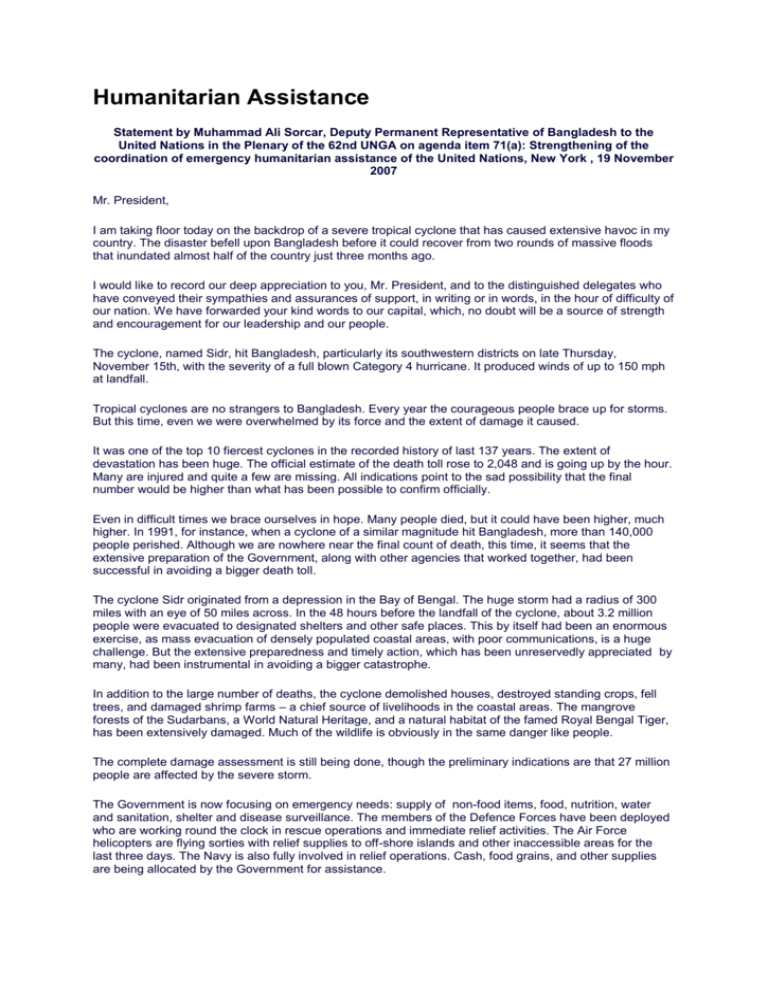
Humanitarian Assistance Statement by Muhammad Ali Sorcar, Deputy Permanent Representative of Bangladesh to the United Nations in the Plenary of the 62nd UNGA on agenda item 71(a): Strengthening of the coordination of emergency humanitarian assistance of the United Nations, New York , 19 November 2007 Mr. President, I am taking floor today on the backdrop of a severe tropical cyclone that has caused extensive havoc in my country. The disaster befell upon Bangladesh before it could recover from two rounds of massive floods that inundated almost half of the country just three months ago. I would like to record our deep appreciation to you, Mr. President, and to the distinguished delegates who have conveyed their sympathies and assurances of support, in writing or in words, in the hour of difficulty of our nation. We have forwarded your kind words to our capital, which, no doubt will be a source of strength and encouragement for our leadership and our people. The cyclone, named Sidr, hit Bangladesh, particularly its southwestern districts on late Thursday, November 15th, with the severity of a full blown Category 4 hurricane. It produced winds of up to 150 mph at landfall. Tropical cyclones are no strangers to Bangladesh. Every year the courageous people brace up for storms. But this time, even we were overwhelmed by its force and the extent of damage it caused. It was one of the top 10 fiercest cyclones in the recorded history of last 137 years. The extent of devastation has been huge. The official estimate of the death toll rose to 2,048 and is going up by the hour. Many are injured and quite a few are missing. All indications point to the sad possibility that the final number would be higher than what has been possible to confirm officially. Even in difficult times we brace ourselves in hope. Many people died, but it could have been higher, much higher. In 1991, for instance, when a cyclone of a similar magnitude hit Bangladesh, more than 140,000 people perished. Although we are nowhere near the final count of death, this time, it seems that the extensive preparation of the Government, along with other agencies that worked together, had been successful in avoiding a bigger death toll. The cyclone Sidr originated from a depression in the Bay of Bengal. The huge storm had a radius of 300 miles with an eye of 50 miles across. In the 48 hours before the landfall of the cyclone, about 3.2 million people were evacuated to designated shelters and other safe places. This by itself had been an enormous exercise, as mass evacuation of densely populated coastal areas, with poor communications, is a huge challenge. But the extensive preparedness and timely action, which has been unreservedly appreciated by many, had been instrumental in avoiding a bigger catastrophe. In addition to the large number of deaths, the cyclone demolished houses, destroyed standing crops, fell trees, and damaged shrimp farms – a chief source of livelihoods in the coastal areas. The mangrove forests of the Sudarbans, a World Natural Heritage, and a natural habitat of the famed Royal Bengal Tiger, has been extensively damaged. Much of the wildlife is obviously in the same danger like people. The complete damage assessment is still being done, though the preliminary indications are that 27 million people are affected by the severe storm. The Government is now focusing on emergency needs: supply of non-food items, food, nutrition, water and sanitation, shelter and disease surveillance. The members of the Defence Forces have been deployed who are working round the clock in rescue operations and immediate relief activities. The Air Force helicopters are flying sorties with relief supplies to off-shore islands and other inaccessible areas for the last three days. The Navy is also fully involved in relief operations. Cash, food grains, and other supplies are being allocated by the Government for assistance. The longer term perspective calls for rehabilitation of livelihoods, infrastructure, health and educational services and increased shelter capacity. The severe destruction and human death toll have prompted sympathy and assistance from many countries. Many of our friends have come forward with support – the international response has been great. The UN Country Team, IFRC, and many NGOs have provided support to the Government through extensive emergency response precautions, including mobilizing in-country staff and pre-positioned relief stocks across southern Bangladesh. Many development partners, including the European Union, China, France, Germany, Japan, Saudi Arabia, Spain, Switzerland, United Kingdom, US, among others, have made early pledges for assistance. We are receiving commitments from others countries, who are standing by the affected population of Bangladesh in their struggle. We are thankful to all countries, organizations and entities which have stepped forward with assurance, material and moral, in our time of great difficulty. We received a statement issued by the spokesperson of the Foreign Ministry today, which said, “While the resilient people of Bangladesh and the government are making all efforts to cope with the adversities, at this time we will welcome support from the international community, as before, through the government, to help mitigate the effects of the disaster.” Mr. President, Time will not permit me to dwell long on the reports of the Secretary-General. I would, however, like to add a few words to the Central Emergency Response Fund. From its establishment in March 2006, it had been a mainstay of emergency response. According to the report of the SG, the Emergency Relief Coordinator committed $259 million to 331 life-saving humanitarian projects in 35 countries in 2006 alone. The fund was also utilized in response to disasters and crises in 24 countries, with 59 per cent of the fund going to rapid response of crises in Africa. We believe this mechanism deserves to be strengthened as it is the main recourse in many emergency situations. The upgraded CERF has proven its usefulness -- in the short span of time after its launch in 2006 -- in many parts of the world, including in my own country. We hope that the fund will continue to receive strong support from member states, in terms of higher political support and increased resource flow. I thank you Mr. President.

